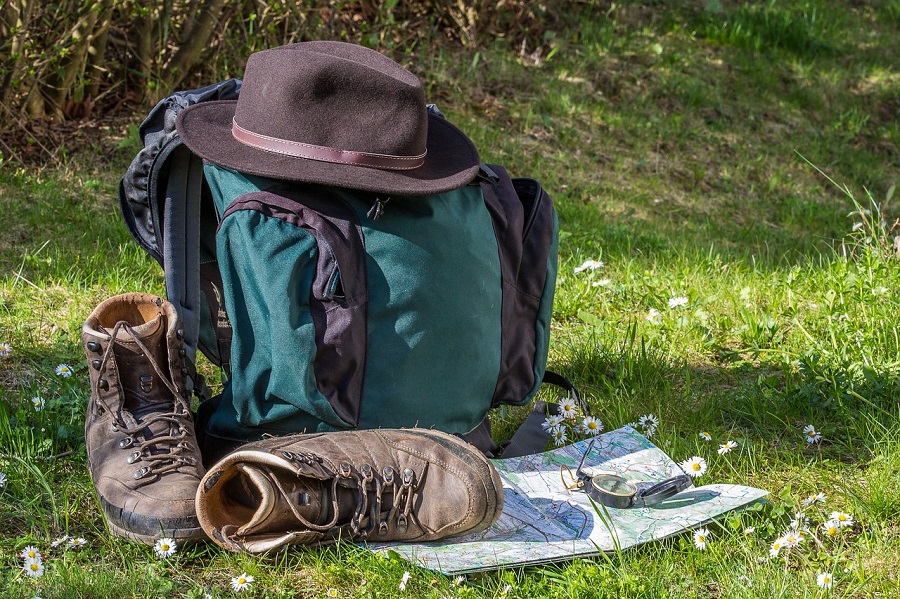Money Management Advice for Digital Nomads and Professional Wanderers
It’s hard to save money as a traveler.
Managing your budget as you visit exciting places is difficult enough, to say nothing of protecting your investments back home. Further, international travel doesn’t necessarily exempt you from responsibilities such as taxes or retirement planning.
If you’re going to be on the road for a significant amount of time this year, make sure your finances are in order. Here’s what 16 experts have to say about managing money abroad, from those who have been there and learned the hard way.
Financial Stability Before You Leave
It’s incredibly tempting to buy a plane ticket and leave your worries behind, but a little planning and strategy can set you up for long-term financial success.
Dave and Jen from Long Haul Trekkers are traveling the world with their bikes and Australian Shepherd, Sora. They knew there was an opportunity of a lifetime on their hands, but they also had student loan debt hanging over them.
“Depending on your career, (non-profit, government, teacher, etc.), you may be eligible for loan forgiveness after 120 consecutive payments,” Dave writes. “In my experience, refinancing saved us a considerable amount on monthly interest.” Refinancing his loans reduced the fees paid to his lender and even led to a lower APR.
Furthermore, it’s important to be strategic about when you quit your job and hit the road. Daniel Schwarz, full-time design writer and digital nomad, found there was a timing sweet spot to quitting his job.
“A little fact that you’ll almost always overlook is that if you don’t earn enough money during the annual tax year, at least in some countries, you’ll be entitled to claim some tax back,” he says. “Make sure to quit right before you hit that threshold (which is around £11,000 in the United Kingdom), and you’ll receive a surprising check months later!”
These are just two small steps that potentially can save you thousands while you’re travelling the world.

Banking While Travelling
Not all travelers are able to maintain a large balance in their bank accounts while they work and see the world. One day, they have enough cash for a trip to Bali and the next struggle to take a cab to the airport. However, some banks require customers maintain minimum balances, or they’ll charge their customers. They also require customers to make a certain number of transactions throughout each month. In both cases, it’s important to find bank accounts that won’t hit you with hefty fees for trying to live your life.
“If you’re a solo entrepreneur and you’re traveling, your income and expenses can fluctuate a lot,” says Emily McGee, founder of My Adaptable Career. “Make sure your account doesn’t require a minimum balance that you can’t meet. You may need to set up direct deposit of a paycheck or perform a certain number of monthly transactions in order to waive [a] monthly fee. Double check your bank’s policy and consider switching if you might be charged fees.”
Meanwhile, if you do plan on storing money for the long term — or even just until you return — make sure you have a savings account that works for you.
“There are a few online savings accounts that offer between .75%–1.05% interest,” says Brandon Quittem for the Yoga Nomads. “This is 15–20x the interest rate of your typical [savings] account. Although 1% is not a HUGE rate, if you have $10,000 saved up, you’ll be earning about $100/year just by having your money sitting in the account.”
While that might not seem like much, he points out $100 was the equivalent of 25 nights of accommodation in India when he and his partner, Anne Rapp, were traveling.
Most travelers focus on withdrawal fees and exchange rates when they plan their bank accounts, but end up paying additional fees and missing out on interest in the end.
Considering Offshore Accounts
Another alternative for saving your money while traveling is an offshore banking account. These options are ideal for long-term nomads who aren’t sure what country will be considered “home” in the next few years.
“An offshore bank is simply a bank located outside of your country of residence,” says Carl Turner of Infinity Financial Solutions. “Safety, security and privacy are three key criteria to consider when choosing. The best choices will protect your deposits against local, political or financial instability; give you easy access to your money wherever you are in the world; facilitate cross-border transfers; and offer multi-currency services as well as potential tax advantages.”
Experts for Expats recommends an offshore bank account for some nomads to reduce complications when tax season comes around. “It's possible that, as an expat, multiple governments may try to tax you. ... Offshore jurisdictions are typically ultra-low or zero tax areas and the institutions that exist there are specialists in structuring your financial map to drastically reduce your total tax liability, wherever you live.”
Of course, your bank account location is only the starting point when figuring out what taxes you owe, and to whom you owe those taxes.

Paying Taxes on the Road
Even if you consider yourself a nomad tied to no nation, you could end up owing taxes in countries you travel around. Andrew Henderson, the Nomad Capitalist, cautions world travelers to know the local tax laws before they set down roots.
“In Europe, most countries practice what is called ‘residential taxation’. Live there long enough — often 183 days or more per year — and you’ll be taxed on your worldwide income. Fortunately, many of the countries sought out by nomads practice ‘territorial taxation,’ which means that only income you earn in that country is taxed. Malaysia, Singapore, and Panama are a few examples of this.”
The challenge is that countries use different criteria to determine tax qualifications. One common unit of measurement is the physical presence within the country, or how many days you lived in that country during the year. Some countries will take you if you live there 300 days per year, while others set the limit at 180 days.
“Different countries use different measures for physical presence tests,” advises Ashray at Backpack Me. “The smart thing to do in this case is to make sure you travel in a way that you do not check off any boxes for tax residence in foreign countries.”
Naturally, residency is only one part of the tax process. You also have to factor in your income sources and any family members that you’re tied to. “You will also start paying tax in Spain if you are considered to gain the majority of your income from activities in Spain, or if your spouse and children are permanently settled there,” says Naomi Rovnick for the Financial Times.
In an interview for Kiplinger, Dan Prescher, senior editor of InternationalLiving.com, found the best way to understand taxes and regulations in your new home country is to reach out to fellow expats who have been there before. “Get in touch with expats who moved to your destination country within the past year or two,” he says. “There's no equivalent of the Better Business Bureau. Word of mouth is important, and reputation is important."
Managing Your Investments Abroad
Many travelers try to set up investments that will grow while they hit the road. They invest in low-risk stocks and bonds that grow over several years. For the most part, this is good advice.
“The reality is that as long as you can hold your investments for the longer term, the risk of losing money should be reduced as you have more time for any losses to be recouped,” says Alison Steed for Telegraph Money.
However, she also cautions expat investors against “set and forget” investing, where travelers maintain the same risk levels despite changes in their financial situation and the economy. “Keeping the same levels of risk as you previously had is a risk that could hurt if markets suddenly turned against you just before you need the money.”
Andrew Hallam, of The Global Expatriate’s Guide To Investing, tells Dan Bortolotti of MoneySense that switching investments out of your home country (Canada, in this case) could be useful over the long term.
“Once an expat moves overseas, their odds of not retiring in Canada actually increase. So yes, it might make sense to go lighter on Canadian bonds and equities. Until recently, I didn’t own a Canadian stock ETF for that reason. Why overweight a geographic sector that may not become my future home country?”
Setting up investments in your home country is great if you plan to return in a few months or years, but might hold you back if you’re leaving your residency behind. Instead, consider international investing and testing the markets abroad.

Exchange Rates and Transfer Fees
Fees seem to follow travelers like a bad virus. From personal transactions to personal income, many nomads struggle with institutions skimming off of the top.
Mish and Rob of Making it Anywhere experienced the frustration of running their business from the road. Most clients wanted to pay them through PayPal, but the fees and poor exchange rate was costing them hundreds.
“When a [transfer] is made into a PayPal account that’s denominated in another currency, PayPal converts the payment into that currency at a horrible exchange rate that bears no relation to reality. … On a recent invoice of ours for a few thousand dollars, the exchange rate left us worse off by $103.” They’ve since become advocates of money transfer services as an alternative with lower fees and better exchange rates.
In some cases, travelers might opt for a locked-in exchange rate to make sure they don’t lose money due to volatile exchange rates. “There are types of contracts which allow you to buy foreign currency at a fixed price for a period of one or even two years,” says Lauren Fritsky of The Life That Broke.
“That means the volatility of the currency rates will not affect you. You will know exactly how much money you will be paying, and how much money in foreign currency you will get in exchange, ahead of each transaction.”
However, if you do exchange money on the road, try to avoid bank-to-bank transfers. “Do not transfer your money internationally with a bank,” says Lauren of Sydney Moving Guide. “Having a separate account just for transferring money may seem like a hassle, but when it comes to saving you money and getting the best exchange rate, it is 100% worth it.”
If you are planning to set down roots in one place as Lauren did, then you definitely want a local bank account. Ryan Takach for Get Rich Slowly spent two years on assignment in London. He was paid in USD but his bills were denominated in GBP:
“Unless your assignment is very short and doesn’t require much out-of-pocket expense, you will need to set up a local bank account right away. You want to avoid paying ATM fees against your US account in any scenario. (It’s cheaper to wire larger sums of money between accounts so you can utilise a local bank account for your day-to-day cash requirements.)”
Many travelers have lost money on the road. They were burned with bad exchange rates, got caught up in fees, found a surprise tax bill, and watched their investments flounder. With a little planning and monitoring, it’s possible to avoid most of these hurdles and make smart financial decisions abroad.
images by: ©tuk69tuk/123RF Stock Photo, maxmann, Mariamichelle, martaposemuckel,
Related Articles
Search
Popular Posts
-
Expat guide: cheapest places to live in the world
March 31, 2022 -
How to find your unique transaction reference (UTR) number
March 31, 2023 -
Currency symbols around the world
February 9, 2022

